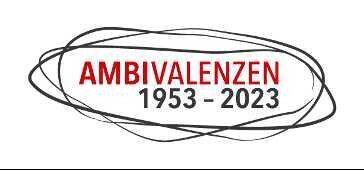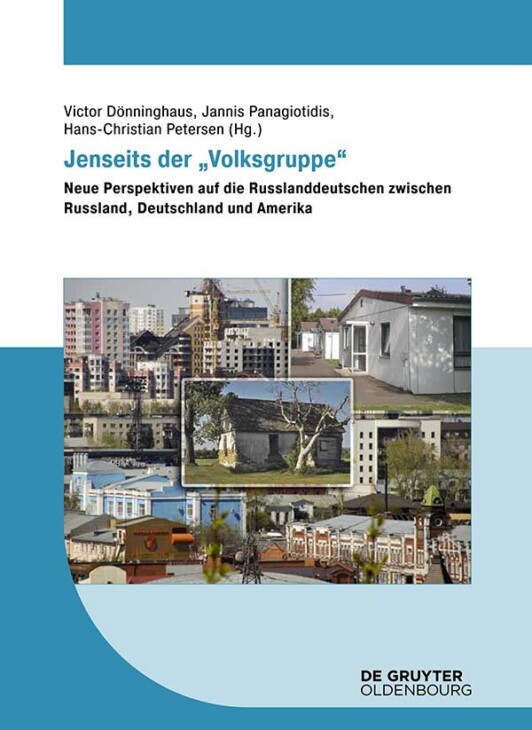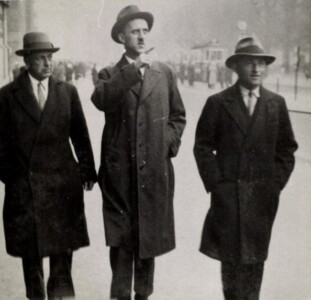Russlanddeutsche Geschichte und post(ost)migrantische Gesellschaft
Forschungslage
Die Erforschung russlanddeutscher Geschichte und Gegenwart besitzt sowohl in historischer Perspektive als auch gegenwärtig eine hohe Relevanz. Rund 2,5 Millionen Russlanddeutsche leben in der Bundesrepublik Deutschland. Diese große, zahlenmäßige Bedeutung steht nach wie vor in Diskrepanz zum geringen Wissen der Gesamtgesellschaft über diese Menschen und ihre wechselvollen Biographien – ein Umstand, den das BKGE durch die kontinuierliche Beschäftigung mit der Thematik verbessern möchte.
Zentrales Anliegen ist die konzeptionelle Öffnung des Feldes. Russlanddeutsche Geschichte ist globale Migrationsgeschichte: Sie reicht von Westeuropa über das Russländische Reich und den (post-)sowjetischen Raum bis nach Nord- und Südamerika – vielfältige Migrationswege, die das Thema für die Forschung vielfältig anschlussfähig machen. Und die es zugleich zu einem zentralen Teil der post(ost)migrantischen Gegenwart der Bundesrepublik werden lassen.
Kontakt: PD Dr. Hans-Christian Petersen
Forschungsverbund „Ambivalenzen des Sowjetischen“

(Daniel Gebel, Hans-Christian Petersen, Alina Jašina-Schäfer)
Der Forschungsverbund „Ambivalenzen des Sowjetischen: Diasporanationalitäten zwischen kollektiven Diskriminierungserfahrungen und individueller Normalisierung, 1953-2023" untersucht am Beispiel von Russlanddeutschen und sowjetischen Jüdinnen und Juden das vermeintliche Paradox der gruppenkonstituierenden kollektiven Repressionserfahrung und der alltäglichen individuellen sowjetischen „Normalisierung". Dabei richtet sich der Fokus insbesondere auf die Peripherien der späten Sowjetunion. Zum anderen erforschen wir, was diese Erfahrungen mit denjenigen machten, die nach dem Auseinanderfall der Sowjetunion auswanderten, oder auch mit jenen, die blieben.
Der Verbund läuft von 2020 bis 2024 im Rahmen des Niedersächsischen Vorab. Er umfasst Standorte in Göttingen, Oldenburg, Lüneburg und Wien. Am BKGE waren zwei Projekte angesiedelt:
- Daniel Gebel, M.A.: Alltag und Erinnerung. Russlanddeutsche und jüdische Kontingentflüchtlinge und ihr „sowjetisches Gepäck" nach der Emigration
- Dr. Alina Jašina-Schäfer: Post-Socialist Imaginations and the Value of Self: Navigating Work, Family Life and Gender after Migration// Postsozialistische Vorstellungen und der Wert des Selbst: Arbeit, Familienleben und Gender nach der Migration
Einen literarischen Einblick in die turbulenten, (post)sowjetischen Lebenswelten eröffnet Artur Weigandts literarisches Roadmovie „Die Verräter". Hans-Christian Petersen hat es gelesen: Ambivalenzen des Sowjetischen - Projektblog, 19. April 2023.
Antiosteuropäischer und antislawischer Rassismus
Menschen aus dem östlichen Europa erlebten und erleben in Deutschland vielfach Diskriminierung und Ausgrenzung. Im öffentlichen Bewusstsein und in aktuellen antirassistischen Debatten kommen ihre Erfahrungen bisher jedoch kaum vor. Dabei machen Personen mit Migrationsgeschichte aus dem östlichen Europa mit über 9,5 Millionen Menschen rund 40 Prozent aller in Deutschland lebenden Menschen mit Migrationshintergrund und rund ein Neuntel der Gesamtbevölkerung aus. Es ist wichtig, ihre Erfahrungen zur Kenntnis zu nehmen und über antiosteuropäischen und antislawischen Rassismus zu sprechen. Der Blick auf das Nachwirken des kolonialen und rassistischen deutschen Erbes im östlichen Europa – eine „Osterweiterung der Erinnerung" (Mark Terkessidis) und damit auch der Rassismusdebatte – ist überfällig und dringend notwendig.
Gemeinsam mit Jannis Panagiotidis (RECET Wien) sowie jungen Aktivist*innen betroffener Gruppen arbeitet Hans-Christian Petersen daran, das Thema auf die Agenda zu setzen. Daraus sind zahlreiche Online-Formate und Expertisen entstanden – hier eine kleine Auswahl:
- Expertise: Antislawischer und antiosteuropäischer Rassismus. Mediendienst Integration, 08. Mai 2023
- Woher kommt das Bild vom „bösen Osten"? detektor.fm im Gespräch mit Hans-Christian Petersen und Sergej Prokopkin, 27. April 2023
- Between Marginalization and Instrumentalization: Anti-Eastern European and Anti-Slavic Racism. Illiberalism. Culture Wars Papers, no. 12, August 2022
- Geschichte und Gegenwart des antiosteuropäischen Rassismus und Antislawismus. Bundeszentrale für politische Bildung, 08. Juli 2022
- O[s]tklick. Zoom-Talk Antislawismus mit Jannis Panagiotidis und Hans-Christian Petersen, 17. Januar 2022
Gemeinsam mit Jannis Panagiotidis (RECET Wien) hat er zudem die erste, grundlegende Studie zu Geschichte und Gegenwart des antiosteuropäischen Rassismus in Deutschland veröffentlicht.
Diskriminierung von Menschen osteuropäischer Herkunft auf dem Arbeitsmarkt
Karl Stumpp (1896-1982) und die Datafizierung russlanddeutscher Geschichte
(Hans-Christian Petersen)
Karl Stumpps Erbe prägt bis heute die russlanddeutsche Geschichts- und Identitätspolitik. Vor allem die auf ihn zurückgehenden Daten und Karten, die bei google maps digital reproduziert werden, bilden bis heute den Unterbau des russlanddeutschen, kulturellen Gedächtnisses. Ausgeblendet wird dabei, dass Stumpps Erbe ein höchst ambivalentes ist: Einerseits steht sein Name für lebenslangen Aktivismus für die ‚eigene Gruppe' und die Gründung russlanddeutscher Interessensorganisationen in Westdeutschland und den USA nach 1945. Anderseits stammt der Großteil der vermeintlich objektiven Daten aus der Zeit des Zweiten Weltkriegs, als er in der deutsch besetzten Ukraine dem „Sonderkommando Dr. Stumpp" vorstand, das ‚rassische' Erfassungen der Bevölkerung durchführte. Dies wirft die Frage nach Kontinuitäten und Brüchen auf. Und verweist zugleich über die Biographie Stumpps hinaus auf unseren zukünftigen Umgang mit der Datafizierung russlanddeutscher Geschichte und dem mit ihr verbundenen, völkischen Erbe.
Für die Studie wurden Archive von Kyjiv bis in den Mittleren Westen der USA aufgesucht. Das Buch wird voraussichtlich 2026 in der Schriftenreihe des BKGE erscheinen.
Bildunterschrift: Amercian Historical Society of the Germans from Russia (AHSGR). Research Library, Lincoln Nebraska, September 2022 (Foto: Hans-Christian Petersen).
First conference of the research network "Ambivalences of the Soviet: Diaspora Nationalities between Collective Experiences of Discrimination and Individual Normalization, 1953-2023"
3-5 February 2022 in Lüneburg, Germany
Soviet diaspora nationalities, including Russian Germans and Soviet Jews, are often considered as collectives constituted by the common experience of repression and discrimination. As individuals, however, they followed personal paths towards normalization of their existence in the years after Stalin's death and became a part of the culturally and nationally diverse Soviet society. For them, complex affiliations and loyalties negotiated between family, neighborhood, their own ethnic group, broader Soviet society, and the so-called external homelands were characteristic and became particularly visible in the period of perestroika and glasnost. When the Soviet Union disintegrated, many became further confronted with questions about their own belonging, which often resulted in their emigration to places like Germany, to which they allegedly belonged. Attempting to make new places their home, they, however, continue experiencing conflicting relationships and identifications, complicated further through broader societal processes that largely marginalize and homogenize them as "others", as non-belonging "Russians" with a seemingly common Soviet "baggage".
The research network "Ambivalences of the Soviet: Diaspora Nationalities between Collective Experiences of Discrimination and Individual Normalization, 1953-2023" (funded by the Ministry of Science and Culture of Lower Saxony and the VW Foundation within the framework of the Niedersächsisches Vorab) departs from a narrative that tells the history of Russian Germans, Soviet Jews, and other Soviet diaspora nationalities in very narrow terms – as a mere story of discrimination and repression, dissent and resistance. Rather, we seek to explore people's complex everyday experiences, practices and discourses of "normalization" and "Sovietization" in the late Soviet period as well as their long-term influence beyond temporal and spatial confines of the Soviet Union.
At the conference, taking place in Lüneburg on 3-5 February 2022, we seek to discuss related topics of life in the late Soviet Union, everyday life in the rural and urban Soviet peripheries, themes of repression and "normalization", intergenerational and transnational multiple affiliations, migration as well as the current situation of those who remained in the Soviet successor states. We welcome contributions especially from young scholars working in the above-mentioned fields and ready to critically reflect on container terms such as "identity", "ethnic group" or "diaspora". A focus on Russian Germans and/or Soviet Jews is desired, but we are also interested in contributions on other nationalities, comparative approaches, etc.
In particular we are keen to receive works on the following topics, but relevant projects on areas not listed here will also be considered:
1. Rural and Urban Life-Worlds.
What aspects came to define everyday life in the late Soviet Union? In what ways did lives develop in the successor states and in Germany? What role did/do different spaces, different familial constellations, processes of rural to urban resettlement, personal networks as well as identifications play in the constitution of people's life-worlds?
2. Migration networks.
In what ways do networks define the migratory process, the process of re-settlement in the country of arrival as well as the decision to stay? In what ways do these networks develop and change over time?
3. Transgenerational experiences.
How are experiences, affiliations, values and stigma, passed on and/or transformed across generations? What role do spatial or political ruptures play in shaping the experiences of communities?
If you are interested in submitting a paper, we would ask you to send us an abstract (max. 400 words) by October 19th, 2021. Working language of the conference is English and a publication of the contributions is planned. The travel and accommodation costs will be covered by the organizers.
Abstracts as well as any questions should be sent to Dr. Kerstin Bischl (kerstin.bischl@uni-goettingen.de ) and Dr. Alina Jašina-Schäfer (alina.jasinaschaefer@bkge.uni-oldenburg.de)
Overview of dates
Deadline for submission of an abstract of max. 400 words: 19 October 2021.
Notification: 1 November 2021
Submission of finished contributions: 20 January 2022
Conference: 3-5 February, 2022.
Conference Spring 2022 (postponed)
Organizers: Anna Flack, Institute for Migration Research and Intercultural Studies (IMIS), University of Osnabrück; Hans-Christian Petersen, Federal Institute for the Culture and History of the Germans from Eastern Europe (BKGE), Oldenburg; Jannis Panagiotidis, Research Center for the History of Transformations (RECET), University of Vienna; Jan Musekamp, Department of History, University of Pittsburgh
Spring 2022 (postponed)
The history of Russian Germans is a history of intensive mobility across space and time. The very presence of settlers from German-speaking Central Europe in the Russian Empire was the result of sustained migration processes ever since Catherine the Great issued her Manifesto for the recruitment of settlers for the internal frontier of the expanding Russian Empire in 1763. People of different regional origins and religious denominations (mostly Protestants, but also Catholics and Mennonites), who only in the 20th century would become known by the collective term "Russian Germans" (Russlanddeutsche), heeded the call. Subsequent movements of these colonists and their descendants in the course of the second half of the 19th century led them into Siberia, Central Asia as well as overseas to the Americas. The First World War, the Russian Revolution and the Civil War were additional catalysts for emigration.
The Germans in the Soviet Union and in Soviet-occupied Eastern Europe were irrevocably set into motion during the Second World War. After the Molotov-Ribbentrop pact, Nazi Germany resettled Germans from Soviet-occupied regions, and during the war also from occupied Soviet territories. Some of those "Heim ins Reich" settlers emigrated overseas after the war. Starting in August 1941, Soviet authorities rounded up their German citizens from the Volga and other regions and deported them eastward. Once they were released from collective confinement in 1955, the deportees inside the Soviet Union were on the move again. Their initial destinations were often in the Central Asian republics, later also both Germanies. With the gradual lifting of the Iron Curtain during the Perestroika years, Russian German mass emigration was set into motion. Only a minority remained in the former Soviet Union.
As a result, today the descendants of the original Russian German settlers live on four continents: predominantly in Europe (Germany), in Asia (Russia beyond the Urals and Kazakhstan), and in North and South America. Depending on when they left Russia, their identification as "Russian German" or "German from Russia" is more or less pronounced. Some of those who left the Soviet Union in the 1990s for Germany now move again, following traditional overseas migration paths to live their Mennonite or Pentecostal faith in remote areas of Canada or Bolivia, thereby creating new global entanglements and connections.
In this conference, we want to approach the global history and the global present of this particular group of ethnic Germans from Eastern Europe from an interdisciplinary angle. We invite papers from historians, anthropologists, ethnographers, linguists, and scholars of other disciplines who deal with topics such as:
- Global networks of Germans from Russia
- Questions of belonging in different imperial, national, and cultural contexts
- Encounters with "indigenous" peoples on different frontiers
- Russian-German diaspora activism
- State diaspora politics of both Germany and Russia
- Contacts across the "Iron Curtain" during the Cold War
- Recent global migrations (e.g. from Germany to the Americas)
- Global religious diasporas a (e.g. Mennonites)
- Everyday material and non-material culture (language, cuisine, housing...)
Participants in the conference are expected to contribute their papers to an English-language edited volume (Lexington Books have already expressed interest). Papers should have an average length of 8,000 words and be in good draft shape by the time of the conference, so we can proceed with the publication process soon after.
Please submit proposals for papers of not more than 300 words to globalrussiangermans@gmail.com until 15 April 2021.
Since we do not expect a return to normal international travel by this fall, the conference will take place online!
(Zwangs)migration und die doppelte Diktaturerfahrung in der russlanddeutschen Geschichte sowie die verschiedenen Narrative der Erinnerung hieran bildeten den Ausgangspunkt für diese gemeinsam vom Museum für russlanddeutsche Kulturgeschichte, dem BKGE sowie dem Institut für Migrationsforschung und Interkulturelle Studien der Universität Osnabrück (IMIS) veranstalteten Tagung.
Durch einen multiperspektivischen Ansatz gelang es, in einem sehr fruchtbaren Dialog mit Vertreter/innen der Flüchtlingsforschung sowie den Zuhörer/innen den Bogen zu aktuellen Migrationsfragen und der Situation Geflüchteter zu schlagen. Die inhaltliche und methodische Öffnung des Forschungsfeldes „Kultur und Geschichte der Russlanddeutschen“ konnte damit ein wichtiges Stück vorangebracht werden.

Neben der Bearbeitung zentraler Themen sieht es das BKGE zudem als seine Aufgabe an, die Vernetzung der verschiedenen Forschungsstränge zu befördern und Impulse für neue Projekte zu geben.
Zu diesem Zweck veranstaltete das BKGE in Zusammenarbeit mit der Universitat Osnabrück und dem Institut für Kultur und Geschichte der Deutschen in Nordosteuropa (IKGN) in Lüneburg eine Tagung zu Stand und Perspektiven der Forschung unter dem Titel "Russlanddeutsche in einem vergleichenden Kontext: Neue Perspektiven der Forschung". Ziel war es, zentrale Desiderate zu benennen und Perspektiven zu ihrer Bearbeitung zu eröffnen.
Die Ergebnisse der Tagung wurden in Band 68 der Schriftenreihe des BKGE veröffentlicht.
Im Rahmen des "Förderschwerpunkts Russlanddeutsche" wird seit 2014 die Juniorprofessur für "Migration und Integration der Russlanddeutschen" an der Universität Osnabrück (Institut für Migrationsforschung und Interkulturelle Studien, IMIS) von der Beauftragten der Bundesregierung für Kultur und Medien (BKM) gefördert.
Vertreter aus Wissenschaft und Kulturvermittlung kamen im Dezember 2012 im BKGE zu einem interdisziplinären Workshop zusammen, um über fachliche Desiderate sowie Zukunftsperspektiven bei der Förderung von Kultur und Geschichte der Russlanddeutschen zu diskutieren.




